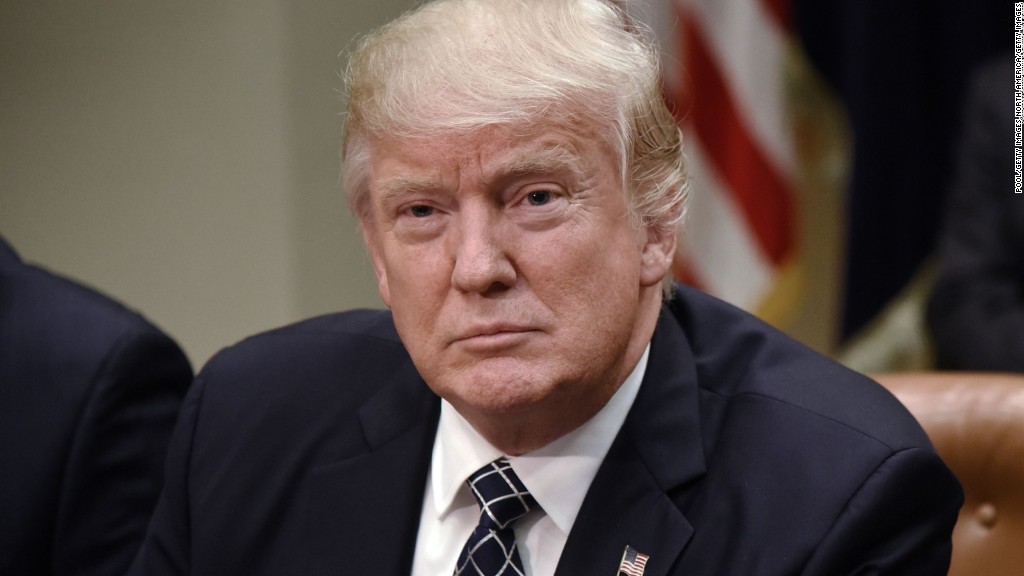
President Trump reported hundreds of millions of dollars in income Friday in financial disclosure forms that shed more light on his vast business holdings.
At his golf courses alone, Trump reported $288 million in income in the past year. That includes $19.8 million from his club in Bedminster, New Jersey, where he has spent some weekends as president.
The numbers were reported in a 98-page disclosure form signed by Trump this week and made public by the Office of Government Ethics. The report covers January 2016 through April 15, 2017.
Trump reported $37.2 million in income in the past year from Mar-a-Lago, the private Florida resort where Trump hosted the president of China and ordered missile strikes against Syria. The club has doubled its membership fee in the past year.
The Mar-a-Lago income figure was $7.4 million higher than on his previous financial disclosure filing, in May 2016.
Trump reported $19.7 million in income through mid-April at his luxury Washington hotel, which has been a center of concerns about conflict of interest because of the possibility that foreign governments can curry favor with the president by booking rooms there. The hotel opened in September.
The president reported up to $7 million in book royalties, including $1 million to $5 million from his book "Great Again: How to Fix Our Crippled America." He reported nearly $11 million from the Miss Universe pageant and an $84,000 pension from the Screen Actors Guild.
All told, Trump brought in approximately $600 million to $650 million in employment assets and income -- or maybe more. The documents make it impossible to calculate precise totals. Officeholders are allowed to disclose figures in ranges, some of which are open ended. For example, his golf course in Aberdeen, Scotland is listed as having a value of "over $50 million."
Related: Read the full disclosure report
Trump has said that he sold all his stock holdings in June 2016 to avoid conflicts of interest. He later said he did so because it was improper to own stocks "when I'm making deals for this country that maybe will affect one company positively and one company negatively."
The form released Friday appeared to confirm that he had sold those stock holdings. It did include income from capital gains and dividends, presumably before the stock sales.
The document makes reference to a sizable loan, between $5 million and $25 million, from UBS Real Estate Investments. The loan had an interest rate of 6.18%. Trump refinanced it with Ladder Capital at a much lower rate of 4.05%.
Overall, Trump reported liabilities of at least $311 million -- mortgages and loans. But the number could be much higher because he was required only to report a range in value for each loan.
Of the 16 loans he reported, five were worth more than $50 million each; one is worth between $25 million and $50 million; and seven were worth between $5 million and $25 million apiece. Another three loans combined were worth less than $1 million.
The form reflects the president's investments, other assets, income, retirement accounts and other holdings.
It is different from a federal tax return, which Trump has refused to make public and which would reveal much more about his business and financial dealings, including foreign business ties, both direct and indirect.
Federal law did not require Trump to file a new financial disclosure until next year, said Ken Gross, a Washington lawyer who has advised business executives and political appointees on finances and ethics.
"It's particularly important that he made the voluntary filing in view of the fact we don't have tax returns," Gross said.
The White House said in a statement that Trump "welcomed the opportunity" to file the form "voluntarily."
Norman Eisen, a Brookings Institution visiting fellow and former ethics lawyer for President Barack Obama, said the document is missing a great deal of valuable information.
"We still don't know the extent or sources of foreign emoluments, the identity of all his investors, partners and financial actors involved in his businesses, the purchasers, including possibly foreign ones of his condos and other properties," Eisen said.
Eisen is chairman of an organization involved in two lawsuits against Trump over foreign payments to his businesses, which the plaintiffs say violate a constitutional clause prohibiting the president from accepting foreign gifts, or emoluments.
Trump last released information about his finances in May 2016, as a candidate. It showed Trump was worth at least $1 billion.
Trump refused to sell his business holdings as president, as experts in government ethics urged him to do. Instead, he transferred them into a trust in his name. Any business profits will ultimately accrue to him when he leaves office.
-- CNNMoney's Matt Egan, Julia Horowitz, Jeanne Sahadi, Mike Tarson and Jackie Wattles, and CNN data journalists David Heath and Aaron Kessler, contributed to this report.
